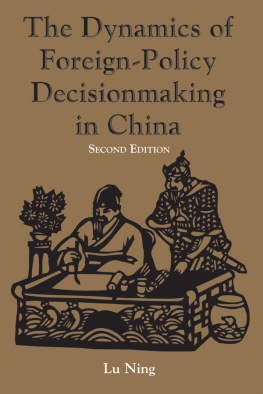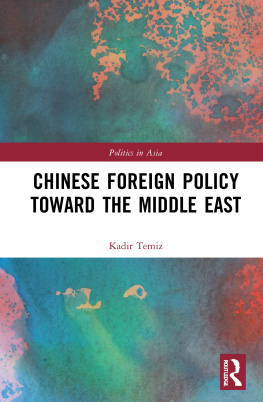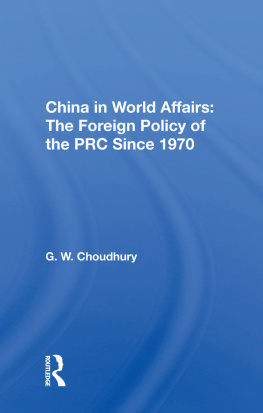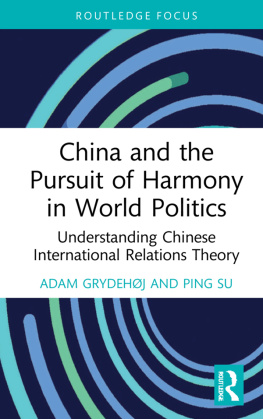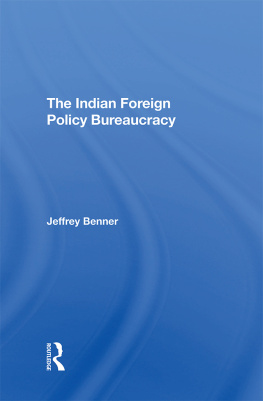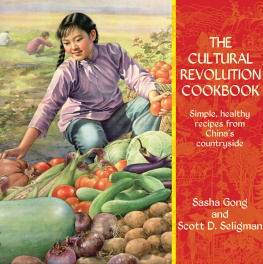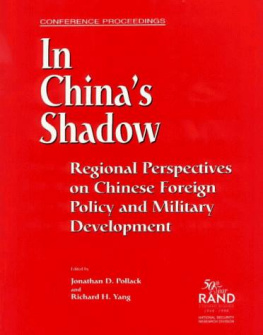
CHINESE FOREIGN POLICY DURING THE CULTURAL REVOLUTION
A PUBLICATION OF THE GRADUATE INSTITUTE OF INTERNATIONAL STUDIES, GENEVA
Also published in this series:
The United States and the Politicization of the World Bank
Bartram S. Brown
Trade Negotiations in the OECD
David J. Blair
World Financial Markets after 1992
Hans Genberg and Alexander K. Swoboda
Succession Between International Organisations
Patrick R. Myers
Ten Years of Turbulence: The Chinese Cultural Revolution
Barbara Barnouin and Yu Changgen
The Islamic Movement in Egypt: Perceptions of International Relations 1967-81
Walid M. Abdelnasser
Namibia and Southern Africa: Regional Dynamics of Decolonization1945-90
Ronald Dreyer
The International Organization of Hunger
Peter Uvin
Citizenship East and West
Edited by Andr Liebich and Daniel Warner with Jasna Dragovi
Introduction to the Law of Treaties
Paul Reuter
The Imperiled Red Cross and the Palestine-Eretz-Yisrael Conflict 1945-1952
Dominique-D. Junod
Ideology and Economic Reform under Deng Xiaoping 1978-1993
Wei-Wei Zhang
CHINESE FOREIGN POLICY DURING THE CULTURAL REVOLUTION
Barbara Barnouin
Yu Changgen
First published in 1998 by
Kegan Paul International
This edition first published in 2011 by
Routledge
2 Park Square, Milton Park, Abingdon, Oxon, OX14 4RN
Simultaneously published in the USA and Canada
by Routledge
711 Third Avenue, New York, NY 10017
Routledge is an imprint of the Taylor & Francis Group, an informa business
The Graduate Institute of International Studies, Geneva, 1998
Transferred to Digital Printing 2011
All rights reserved. No part of this book may be reprinted or reproduced or utilised in any form or by any electronic, mechanical, or other means, now known or hereafter invented, including photocopying and recording, or in any information storage or retrieval system, without permission in writing from the publishers.
British Library Cataloguing in Publication Data A catalogue record for this book is available from the British Library
ISBN 10: 0-7103-0580-X (hbk)
ISBN 13: 978-0-7103-0580-0 (hbk)
Publishers Note
The publisher has gone to great lengths to ensure the quality of this reprint but points out that some imperfections in the original copies may be apparent. The publisher has made every effort to contact original copyright holders and would welcome correspondence from those they have been unable to trace.
CONTENTS
War (Excerpts of the report to Mao by a special group headed by Chen Yi, the Foreign Minister, 11 July 1969)
INTRODUCTION
A nations foreign policy is determined to a large extent by domestic and external environments. Though there are certainly other factors to be reckoned with, such as history, ideology, personality and leadership, the domestic and external environments have generally been singled out as the crucial factors in the determination of foreign policy of any nation. But what exactly is the weight of the two factors in this process, how do they relate to each other, which of them, at a given time, has the stronger impact all this can be evaluated only through a process of careful investigation of the policy behaviour of the nation in question.
In the case of China during the Cultural Revolution, domestic criteria clearly played an important role during the initial phase, a phase characterized by the radicalization of Chinese political thinking and a phase that was replete with unusually sharp rhetoric. In fact, the turmoil within the country at that time was of such dimensions, factionalism so rampant, ideological discourse so incendiary, that all this had a strong impact on foreign affairs on the Ministry of Foreign Affairs, on Chinese perceptions of the outside world and on the decision-making process pertaining to this sector. Inevitably, this brought about a change in Chinese foreign policy, rendering it more ideological and more revolutionary and defining, as its main objective, the spread of the Chinese revolutionary movement and of Mao Zedong Thought throughout the world. This process albeit utopian damaged Chinas diplomacy and led to its increased isolation from the international scene.
The linkage between domestic and foreign policy thus was evident during the first phase of the Cultural Revolution, but it was not so clear during the second phase. In fact, it had become opaque. While domestic preoccupations continued to dominate the leaderships concerns and while its incendiary rhetoric regarding the external world continued to be strongly influenced by internal revolutionary concepts, a slow dissociation began to emerge between the revolutionary agitation occurring inside China and the designing of its foreign policy at the upper spheres of the national leadership. While China was in turmoil, its foreign policy was becoming more sober, more governed by national interest, more concerned with national security and more preoccupied by its increasing isolation. China was becoming more susceptible to an adverse external environment.
The inauguration of this new process of normalization eventually the major catalyst of fundamental changes in Chinese foreign policy occurred in the middle of domestic pandemonium and factional fighting. Zhou Enlai, who appeared to the world as the architect of the normalization process on the Chinese side was, at that time, the victim of fierce factional strife which threatened his political future.
In this study the Cultural Revolution as such will not be analysed, for this has been done elsewhere. What is proposed here is first of all to examine the effect it had on the very functioning of the Chinese Ministry of Foreign Affairs, and how the turmoil of the Cultural Revolution, of which the country had become a victim, spilled over to this highly elitist and prestigious Ministry. In sum, we will focus on the chaos that engulfed the institution.
In the Western world it might be difficult to imagine that the staff of a Foreign Ministry, instead of implementing foreign policy, became bogged down in a domestically determined political movement. In fact, so profound was the involvement that only a small segment of the staff continued to handle foreign affairs while the majority of the functionaries in the Ministry, and in the embassies abroad, were busy keeping abreast of domestic events and of the changing political fortunes which depended on internal factional strife. This situation began to change slowly only after dtente with the United States, after Chinas entry into the United Nations and the ensuing spread of its diplomatic relations with an increasing number of Western countries.
The second point on which this study proposes to focus is the decision-making process in foreign policy. Who took the major decisions? How were they taken, and what were the different inputs that went into the designing of foreign policy?
The personality factor is increasingly recognized as a crucial one in the designing of foreign policy, perhaps even more important than some of the established institutions. Already in the 1960s, Joseph Frankel had considered it as a legitimate and important topic of historical analysis in all investigations of external state behaviour.


